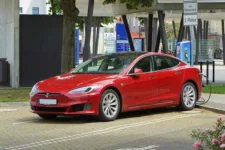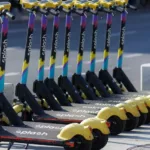In mid-June, Tesla, Honda, and other auto manufacturers reported advanced driver assistance-related crashes to the NHTSA.
This reporting follows an order issued by the agency requiring all automakers to report all crashes involving ADAS (Advanced Driver Assistance Systems) and vehicles fitted with autonomous driving systems tested on American roads.
Over 390 Crashes Reported
In total, 392 crashes were reported to the NHTSA since July 2021, with Tesla Inc. reporting the highest number of crashes amounting to 273 crashes involving its ADAS future, dubbed autopilot.
Honda Motors came a distant second with 90 crashes. Alphabet Inc’s Waymo reported 62 crashes, General Motors Cruise 23, and other auto-makers less than ten crashes. Of the 392 crashes, six deaths were reported, and five severe injuries.
Each Automaker Tracked Its Metrics
According to the NHTSA, each automaker tracked its metrics differently and discouraged car makers from using the data to make comparisons on performance. “The metrics do not account for how widely the feature was in use and thus cannot be a good measure of how safe one vehicle model is to the other,” says car accident lawyer Sean Roberts of Roberts Markland, LLP.
When addressing questions raised by journalists, Honda said it didn’t find any defects in its feature, saying the crash reports were based on unverifiable customer statements seeking to comply with the NHTSA’s 24-hour reporting rule.
Who Is Liable?
According to the NHTSA, this data has been useful in the past in triggering investigations and recalls, which have helped fix defects. The agency did not address who is responsible for ADAS-related accidents, which have become a source of heated debate among road safety experts.
Fully autonomous vehicles are yet to get on American roads. This means a driver must be in the driver’s seat, even in vehicles with the most advanced driver assist feature. Under normal circumstances, the driver will be responsible for controlling the vehicle and thus liable for accidents.
Data Inconclusive
Even with the NHTSA terming the data inconclusive, it will surely impact consumer trust in the features and, consequently, some car models. According to Steven Cliff, the NHTSA administrator, collecting this data aims to help crash investigators identify trends that could point to specific defects.
One area of interest to the agency is the accidents that occur within 30 seconds of activating a driver-assist feature. To gather data on this trend, the NHTSA requires automakers to report such accidents to the NHTSA within 24 hours of the accident occurring.
The agency has intensified its scrutiny of autopilot while paying close attention to Tesla’s 830,000 vehicles with advanced semi-autonomous features. This probe is the first step in determining whether the agency will order a recall of the car models under investigation.
Tesla Under Scrutiny
The agency is in the preliminary stage of evaluating the performance of the Tesla autopilot feature after almost a dozen instances where Tesla vehicles have struck stationary emergency vehicles.
The almost a dozen crashes involving stopped emergency vehicles are not the only crashes under the NHTSA’s radar. The NHTSA is also engaged in 35 crash investigations involving Teslas, in which ADAS was suspected to be a factor. The crashes caused 14 deaths, including one in May in California, which killed three people.
Tesla, on its website, says that its autopilot feature is never meant to replace the driver but to assist them. Some safety experts, however, think that Tesla should carry some of the blame.
In Germany, a court found Tesla’s autopilot tag misleading for creating an impression of self-driving abilities, thus giving consumers a false sense of safety in the feature, which sometimes turns tragic. This court’s ruling opens a door for Tesla to have liability in Tesla accidents involving ADAS in Germany.








